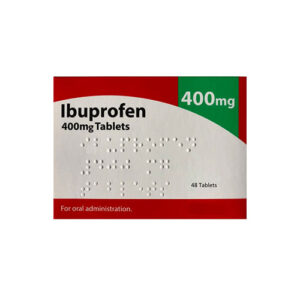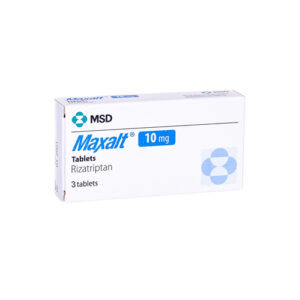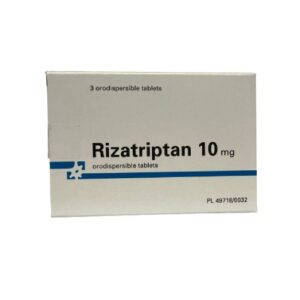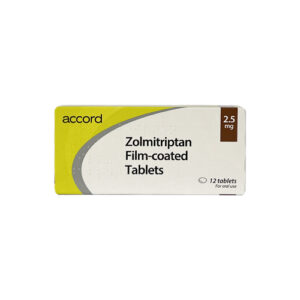Showing 7 products
Pagination
What are migraines?
Migraine is a neurological condition that impacts a substantial number of individuals globally. Those who suffer from migraines encounter frequent, moderate to severe headaches, typically accompanied by a mix of symptoms.
There are various types of migraines, which are elaborated upon below. They include common migraines, abdominal migraines, migraine headaches, classic migraines, retinal migraines, basilar-type migraines, hemiplegic migraines, and menstrual migraines.
It’s important to understand the symptoms, triggers, and available treatments for migraines to effectively manage this condition.
Those of us who suffer from migraines regularly understand when an episode is beginning.
Although there is no cure, a variety of treatments are available to provide relief.
Consider seeking professional advice if you have migraines frequently and don't know what's causing them.
The most common form of migraine is characterised by a severe headache along with other symptoms such as nausea, vomiting, or sensitivities to light or sound.
It is more common for women to suffer migraines, which normally begin in early adulthood.
Approximately one in five women and one in fifteen men are thought to be affected by them. As people age, migraines typically improve, although sometimes they can become worse.
People with migraines experience varying levels of symptoms and their lifestyles can be impacted in different ways. A migraine can last for days at a time, involve severe pain, sickness, sensitivity to light and/or sound and occur many times per week. In contrast, migraines can occur only very rarely and occur months, or even years, apart and they are typically mild and short-lived.
In addition to having a high impact on your quality of life, migraines can also make it difficult to work. If you want to reduce migraine frequency, it is vital that you treat migraines effectively.
Symptoms of Migraines
Migraines present with a wide range of symptoms, which can vary between individuals and types of migraines. Some common symptoms experienced by people with migraines include:
Migraine headaches are characterized by a throbbing or pulsating pain that typically affects one side of the head. This symptom can range from moderate to severe and can last for several hours or even days. In certain cases, migraines can also cause abdominal pain or discomfort, particularly in children. B. Aura and Neurological Symptoms
During a migraine attack, some individuals may experience visual disruptions known as auras, which can include seeing flashing lights, zigzag lines, or having temporary blind spots. Blurred vision or other visual disturbances can also occur, affecting the clarity of their sight. Additionally, migraines can cause various neurological symptoms, such as tingling or numbness in the face or extremities, difficulty speaking, confusion, or double vision. Sensory Sensitivity
Individuals who suffer from migraines often experience a heightened sensitivity to light, known as photophobia. Exposure to bright lights or particular light sources can exacerbate migraine symptoms. Sensitivity to sound, or phonophobia, is also a common symptom of migraines. Loud noises or specific frequencies of sound can trigger or intensify migraines. Additionally, some people with migraines experience a heightened sensitivity to odours, including strong smells or certain chemicals.. D. Other Symptoms
Migraines can cause fatigue and lethargy, leading to a need for rest or sleep for recovery. Some individuals may experience migraines triggered by changes in barometric pressure, such as before a storm. Nausea and vomiting are common symptoms of migraines. Neck stiffness, pain, and associated muscle tension can also occur during a migraine attack.
Diagnosis of Migraines
Medical Evaluation
A comprehensive medical history is crucial for healthcare providers to accurately diagnose migraines. It involves recording the frequency, duration, and nature of the headaches, as well as identifying any triggers or accompanying symptoms.
To diagnose migraines, medical organizations like the International Headache Society have established specific criteria that must be met.
Differential Diagnosis
It is important to distinguish migraines from other types of headaches, like tension headaches, cluster headaches, or sinus headaches, in order to obtain a precise diagnosis.
If you are experiencing headaches, your doctor may suggest imaging tests such as magnetic resonance imaging (MRI) or computed tomography (CT) scans to rule out any underlying conditions that may be causing them. Another option to consider is checking your hormone levels and possibly undergoing hormone replacement therapy.
Migraines can be triggered by hormonal changes, especially in women. By monitoring hormone levels, such as oestrogen and progesterone, patterns and potential triggers for migraines can be identified.
If you are a woman experiencing migraines associated with hormonal fluctuations, you may consider hormone replacement therapy (HRT) as a treatment option. However, it is important to discuss with a healthcare professional before making a decision, taking into account your individual factors and potential risks.
Treatment and Management of Migraines
Acute Treatment
If you're experiencing mild to moderate migraine pain, non-prescription pain relievers like acetaminophen, ibuprofen, or aspirin can help. However, for severe migraines or those that don't respond to over-the-counter medications, healthcare professionals may prescribe specific migraine medications like triptans or ergotamines. Nasal sprays can also be used for faster relief. If you're experiencing specific symptoms like nausea or vomiting during a migraine, your healthcare provider may prescribe medications to target those symptoms and provide relief.
Preventive Medications
If someone experiences frequent or severe migraines, their doctor may suggest taking preventive medications to help reduce the frequency and severity of the attacks. Some common medications used to prevent migraines include beta-blockers, anticonvulsants, antidepressants, and calcium channel blockers. The specific medication prescribed will depend on factors such as the individual's medical history, how often they experience migraines, and potential side effects.
Lifestyle Modifications
For individuals who suffer from migraines, lifestyle changes can be helpful. These changes include identifying potential triggers by keeping a migraine diary that tracks factors such as certain foods, stress, lack of sleep, hormonal changes, physical activities, or environmental factors such as strong odors or weather changes. Maintaining regular sleep patterns, ensuring
an adequate amount of sleep, and creating a relaxing bedtime routine can also help prevent migraines. Engaging in relaxation techniques, such as meditation, deep breathing exercises, or practicing relaxation exercises, can help manage stress and reduce migraine frequency. Additionally, adopting a well-balanced diet that includes regular meals, avoiding common trigger foods such as caffeine or food cravings, and engaging in regular physical activities can contribute to overall migraine management.
Complementary and Alternative Therapies
Biofeedback therapy is a technique that can help individuals increase their awareness of their body's physical responses. By learning to control functions such as heart rate, muscle tension, and blood pressure, it can help reduce the symptoms of migraines. Another alternative therapy is acupuncture, which involves the insertion of thin needles into specific points on the body. This technique can promote relaxation and relieve migraine pain.
Common Types of Migraines
There exist various types of migraines, each with distinctive characteristics and symptoms. A few of the frequently occurring types of migraines comprise:
There are several types of migraines that a person can experience. Common migraines are those that happen without an aura and typically result in moderate to severe headache pain. Classic migraines, on the other hand, involve an aura that can cause visual disturbances and neurological symptoms before the onset of a severe headache. Retinal migraines are characterized by temporary vision loss or blindness in one eye, often accompanied by a headache. Hemiplegic migraines can cause temporary paralysis or weakness on one side of the body, along with other migraine symptoms. Menstrual migraines are triggered by hormonal changes during the menstrual cycle. Episodic migraines refer to migraines that occur occasionally, with distinct episodes of headache pain and accompanying symptoms.
Diagnosis and Treatment of Migraines
A. Diagnosis of Migraines
If you are experiencing migraines, a medical evaluation will be needed. This will include a detailed medical history and assessment of your symptoms. Health professionals may also perform a differential diagnosis to rule out other types of headaches or underlying conditions. Sometimes, imaging tests may be recommended to help diagnose the condition.
B. Treatment of Migraines
The management of migraines involves addressing immediate symptoms as well as taking preventive measures.
During a migraine attack, certain medications can be used to reduce pain and other associated symptoms. These medications can be over-the-counter pain relievers like acetaminophen or ibuprofen, or prescription drugs like triptans or ergotamines. Nasal sprays can also offer quick relief. In addition, medications targeting specific symptoms such as nausea or vomiting may be prescribed.
If you experience frequent or chronic migraines, your doctor may recommend preventive medications to reduce the frequency and severity of your attacks. These medications should be taken regularly, even during symptom-free periods. Lifestyle modifications, such as identifying trigger factors, maintaining regular sleep patterns, managing stress, following a healthy diet, and engaging in relaxation techniques, can also help prevent or minimize migraine occurrences.
Some people may consider using complementary and alternative therapies to manage their migraines. These techniques could include biofeedback, acupuncture, or herbal supplements. However, it's crucial to seek advice from healthcare professionals before incorporating any of these approaches into a treatment plan.
Migraine treatment from Access Doctor
Migraines are a complicated neurological condition that involves recurring headaches and other related symptoms. It is important for individuals who experience migraines to gain a thorough understanding of the various types, triggers, symptoms, and treatment options available in order to manage their condition effectively and improve their overall quality of life. Seeking guidance from healthcare professionals is essential for obtaining an accurate diagnosis and creating a personalized treatment plan. Access Doctor provides a range of migraine treatments, so if you are unsure about your symptoms, our prescribers are available to assist you.
What causes migraines?
The cause of migraines is believed to be abnormal brain activity affecting nerve signals, chemical transmitters, and blood vessels within the brain. In spite of the fact that it is unclear really what causes the abnormal activity, many believe that your genes may predispose you more likely to suffer from migraines if you come into contact with a certain trigger factor.
Migraines are caused by a variety of triggers, and each sufferer knows which triggers are likely to trigger them.
Migraine trigger factors can include:
- Stress, anxiety, tension, shock, depression, and excitement are all emotional triggers.
- Dietary triggers include irregular eating patterns, poor diet, dehydration, alcohol, tyramine additives, caffeine (in coffee or tea), and specific foods such as cheese, chocolate, and citrus fruits.
- Physical Triggers: tiredness, shift work, poor posture, neck or shoulder tension, jet lag, low blood sugar, strenuous exercise.
- Environmental triggers: bright lights, flickering lights and screens, smoking, loud noises, changes in temperature or humidity, strong smells, a stuffy atmosphere.
- Medicinal Triggers: some sleeping tablets, some oral contraceptive pills, some HRT (hormone replacement therapy).
- Hormonal triggers: women may suffer migraine attacks around their period, possibly because of low levels of oestrogen.
What treatments are available for Migraines?
Despite their inability to be cured, migraines can ease over time or even disappear. The goal of migraine treatment is to relieve symptoms and, if taken early enough, to prevent their onset. Depending on the symptoms and severity of migraines, over-the-counter painkillers can be used as well as prescription treatment.
Painkillers
The throbbing headache associated with a migraine attack can usually be relieved by taking painkillers such as paracetamol, ibuprofen, or aspirin as soon as possible. It is advisable to take them at the first sign of symptoms, not when you already have a headache, since they will be less effective at that point. Migraine pain may be relieved more effectively with soluble painkillers because they are absorbed faster.
In cases where simple painkillers are not effective, codeine-containing painkillers, such as Solpadeine and Nurofen Plus, might be more effective.
Painkillers should be used with caution, as overuse is dangerous. All painkillers can cause headaches and migraines if taken regularly.
Triptans
A Triptan will be prescribed to you if your migraines are uncontrollable by simple painkillers. When taken with painkillers, triptans (also known as 5-HT1 agonists) contract the blood vessels in the brain. Triptans help to alleviate migraine symptoms by reversing the widening of blood vessels in the brain, which is thought to trigger migraine attacks. Some of the chemical changes occurring within the brain during a migraine attack may be stabilised by them as well.
Despite having very similar modes of action, each Triptan can work differently depending on the individual. Despite the slight differences between the drugs and the side effects they cause, finding the right one for you is much more relevant. It might take trying a few different Triptans before you find the one that suits you best. In order to determine whether a Triptan is effective, The British Society for the Study of Headache (BASH) recommends using each Triptan on three separate occasions. Consider trying another Triptan or a stronger strength if you feel it isn't working.
Consider the method of administration when choosing the correct triptan, as this can enhance its effectiveness.
Triptans are available in tablet form, which is effective for most people. However, if you experience nausea or vomiting, you may find them difficult to take.
A tablet's onset of action can also be slower than that of other treatments. Therefore, it may not be a wise choice when a fast response is needed. It is advised that tablets are taken as early as possible during a migraine attack. This is because there is evidence that drug absorption may decrease during this time.
Where tablets cannot be used because of the need for fast action or when nausea or vomiting make swallowing impractical, nasal sprays or wafer melts may be better options.
You should check the individual instructions for each Triptan because each has a slightly different dose and way to administer it. It is recommended to take the Triptan at the onset of a migraine headache (the migraine attack phase), not during the prodromal or aura phases. Treating a migraine is most effective when triptans are taken at this stage. In most cases you can repeat the dose after 2-4 hours if the treatment was effective and the headache returns.
Triptans may be taken in conjunction with pain-killers and anti-sickness medicines for the treatment of all migraine symptoms.
Anti-emetics (anti-sickness treatments)
A migraine attack can be made more comfortable by anti-sickness treatments, such as Buccastem. In cases where nausea is a regular symptom of migraine, anti-sickness treatments should be started before pain medications. They are more effective in treating nausea and vomiting if taken early in the migraine attack.
Taking Buccastem will prevent nausea and vomiting and will help prevent symptoms. Buccastem is a buccal tablet, meaning that it dissolves between the lip and gum. This eliminates the need to swallow a tablet when feeling nauseous. It is easier for the drug to be absorbed through the gums, so it takes effect faster.
Can Migraines be prevented?
Migraine prevention begins with identifying and avoiding migraine triggers. In order to learn to avoid migraine triggers, you should keep a migraine diary. Below is a list of typical migraine triggers. There are other triggers that you may be sensitive to that are not listed. Migraine triggers vary from person to person.
It may be beneficial to seek preventative treatment from your doctor if you experience more than five migraine days in a month.
If you have frequent, severe migraines, you may benefit from treatment such as topiramate, propranolol or gabapentin, which can prevent migraines.
Consider making an appointment with your GP to discuss migraine prevention treatment and keep a comprehensive migraine diary to aid diagnosis.




We’re here to help.
Our friendly team is available to help Monday to Friday 9:00am - 5:00pm.
If you need urgent assistance, do not use this service. Call 111, or in an emergency call 999.







